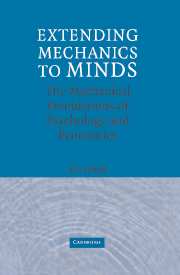Book contents
- Frontmatter
- Contents
- Preface
- Outline of the book
- Part I Reconciling Natural and Mental Philosophy
- Part II Reconstructing Rational Mechanics
- Part III Mechanical Minds
- 8 Mental varieties
- 9 Mind and body
- 10 Attitudes, outlook, and memory
- 11 Reasoning
- 12 Rationality
- 13 Learning
- 14 Uncertainty
- Part IV The Metaphysics of Mechanics
- Part V Conclusion of the Matter
- System of Notation
- Bibliography
- Index
14 - Uncertainty
from Part III - Mechanical Minds
Published online by Cambridge University Press: 21 September 2009
- Frontmatter
- Contents
- Preface
- Outline of the book
- Part I Reconciling Natural and Mental Philosophy
- Part II Reconstructing Rational Mechanics
- Part III Mechanical Minds
- 8 Mental varieties
- 9 Mind and body
- 10 Attitudes, outlook, and memory
- 11 Reasoning
- 12 Rationality
- 13 Learning
- 14 Uncertainty
- Part IV The Metaphysics of Mechanics
- Part V Conclusion of the Matter
- System of Notation
- Bibliography
- Index
Summary
The preceding development of mental mechanics does not require determinism of mechanical systems. It instead requires only that motion satisfy mechanical relationships independent of determinism requirements.
The preceding chapters also illustrated several sources of possible indeterminacy. Reasoning, whether habitual or deliberate, can produce indeterminism when several reasons apply at the same instant, requiring serialization or conflict resolution. In addition, rational deliberation can result in several possible self-constructions from reasoning rules; conservative update in response to reasoned changes can follow multiple resolutions; and volition can encompass multiple choices of action on the basis of the same desires and intentions. These sources of mechanical indeterminism complement the forms of indeterminism acknowledged in traditional mechanics, including situations of indeterministic collapse and bifurcation considered in continuum mechanics and the pervasive indeterminacy of quantum physics. All of these forms of indeterminacy represent theoretical allowances of multiple possibilities that stand separate from uncertainties arising from the practicalities of measurement connected with repeatability and resolution of measuring apparati.
From the viewpoint of psychology, mechanical indeterminism generates what one can call a “kinematical” notion of uncertainty, in which one seeks to measure the amount of indeterminism, or degree of uncertainty about predictions introduced by indeterminism. In the simplest terms, qualities of motion shared by all possible histories represent certain predictions about motion, while qualities exhibited by some histories but not by others represent uncertain predictions about motion. The kinematic conception of uncertainty provides means for comparing these degrees of certainty and uncertainty in quantitative terms.
- Type
- Chapter
- Information
- Extending Mechanics to MindsThe Mechanical Foundations of Psychology and Economics, pp. 346 - 370Publisher: Cambridge University PressPrint publication year: 2006

